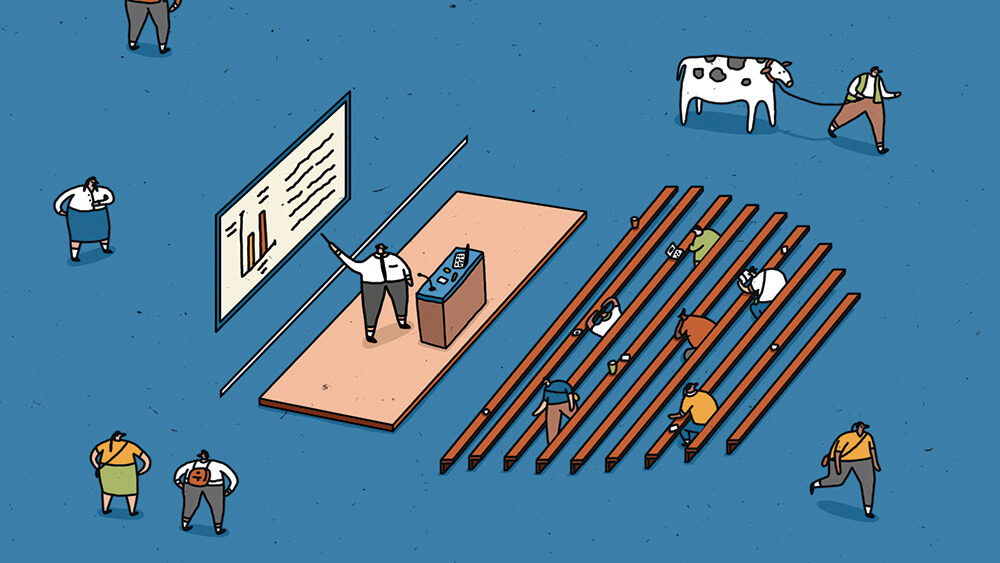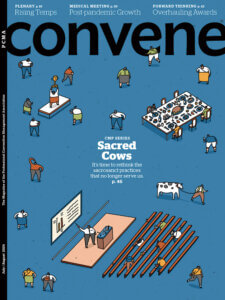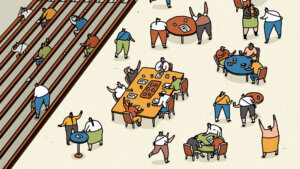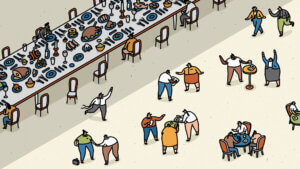
We asked event planners what event sacred cows they think need to go away or change. (Illustrations by Dale Crosby Close)
The pandemic served as a wake-up call to the meetings industry, but perhaps we’ve hit the snooze button. Rendered impossible by COVID, face-to-face events have since returned with a vengeance — and in all too many cases, in rinse-and-repeat mode. Which is understandable, given the everyday challenges of designing and delivering events on a budget with escalating costs, often with a smaller staff and relationships with supplier partners that have become strained.
But having an “If it ain’t broke, don’t fix it” mindset closes off the opportunity to deeply question how we got here and where we need to be headed in the ways we host gatherings. What are our sacred cows — the pieces of furniture we treat as permanent fixtures in business events that should be dismantled?

Read the digital facsimile version of the July-August 2024 issue.
Let’s take, for example, an almost universal practice among research conferences: the peer-review process, the evaluation and appraisal of submitted research papers or presentation proposals by specialists in a particular field. It’s something experimental psychologist Adam Mastroianni, Ph.D., put under a microscope in his science blog Experimental History. For centuries, Mastroianni writes in his post, scientific publishing was a hodgepodge lacking any oversight. After WWII, governments poured funding into research and “they convened ‘peer reviewers’ to ensure they weren’t wasting their money on foolish proposals.” This practice became de rigueur in the scientific community, and today, “pretty much every journal uses outside experts to vet papers, and papers that don’t please reviewers get rejected,” Mastroianni writes, while “committees and grant agencies act as if the only science that exists is the stuff published in peer-reviewed journals.”
According to Mastroianni, we’ve been running this “grand experiment” now for six decades. “The results are in,” he writes. “It failed.” He bases his verdict on data that shows that research productivity has been flat or declining for decades and peer review doesn’t seem to have changed that trend. Moreover, he says, peer review doesn’t do the thing it’s supposed to do, which is to catch bad research and prevent it from being published. He cites studies in which scientists have deliberately added errors to papers, sent them to reviewers, and counted how many they catch. The result? Reviewers identified only between 25 and 30 percent of the major flaws that had been embedded in their papers.
A recent example from the conference industry further calls into question the notion of the peer-review process as the gold standard. At a high-profile and prestigious conference studying artificial intelligence, it was found that peer reviews used the word “meticulous” almost 3,400 percent more than reviews had the previous year, according to a story in The Salt Lake Tribune.
The word “commendable” increased by about 900 percent and “intricate” by more than 1,000 percent — other major conferences in the sector showed similar patterns. “Such phrasings are, of course, some of the favorite buzzwords of modern large language models like ChatGPT,” the Tribune article points out. “In other words, significant numbers of researchers at AI conferences were caught handing their peer review of others’ work over to AI — or, at a minimum, writing them with lots of AI assistance.”
You cannot stop change or progress. You must learn to constantly question everything. When someone says, ‘That is the way we have always done it,’ I simply ask, why? Is that really going to work? What outlandish crazy idea can we try that is different? If it fails, fail fast and move on, but if you do not try, this industry will be left behind.”
Insider Information
While outside-the-business-events-industry perspectives offer a different lens through which to view — and question — traditional conference practices, who we really wanted to hear from were events industry practitioners themselves. So, we asked nearly 500 planners who participated in Convene’s recent Salary Survey to share their sacred cows (see below). Their open-ended responses criticized everything from educational program formats to F&B to pricing models to work/life balance expectations. But we wanted to go one step further, from venting to constructive criticism. We also reached out to a variety of events industry professionals around the globe to ask what they think needs to be overhauled or excised — and what should events be doing instead? (See Breaking From Convention below to find links to the responses, curated under three categories: Structure and Programming, Exhibits, anf Food and Beverage.)
In some cases, the professionals we spoke to didn’t have a specific replacement in mind. Going back to the peer-review process, for example, Josh Henry, CMP, meetings manager and diversity and inclusion lead for SPIE, the international society for optics and photonics, cautioned against throwing the baby out with the bath water. “While I understand the frustration with what is often a less than perfect assurance model,” he told Convene, “peer review is still such an important part of scientific work. The better approach is to build in additional tools that ensure that content is credible.”
Even after his critical analysis of peer review, Mastroianni said he didn’t have a ready substitute. But he offered some advice that we can all put into practice across all aspects of event planning: “I don’t know what the future of science looks like,” he wrote. “Maybe we’ll make interactive papers in the metaverse or we’ll download datasets in our heads or whisper our findings to each other on the dance floor of techno-raves. Whatever it is, it’ll be a lot better than what we’ve been doing for the past 60 years. And to get there, all we have to do is what we do best: experiment.”
Michelle Russell is editor in chief of Convene.
From our Salary Survey
What needs to go? Some sacred cows shared by Salary Survey respondents.
- “Networking = boozy receptions.”
- “The notion that streaming takes away from in-person attendance — total myth.”
- “The formula of conferences — four tracks, expo, and booths, etc.”
- “Large, flashy evening events. Spend that money and time on better education for attendees.”
- “Awards and ceremonies. Participants do not want to sit through them any more. We need a better way to honor awardees and keep attendees engaged while honorees are being awarded.”
- “Continuing education strict processes/protocols that limit creativity and engaging event options.”
- “Resort fees, meeting room rental charges in addition to F&B minimums, significant upcharges on AV equipment, etc.”
- “Age bias: Not everyone has to be young to do this job well. People with experience should be valued and paid accordingly.”
- “That content is king. With AI coming into the industry, content will be easier and easier to come by. Creating meaningful experiences is going to matter more.”
- “Decaf coffee, ribbons, business cards, ice-breakers, alcohol (or at least offer non-alcoholic options that aren’t soda).”
- “Plated meal general sessions. It’s loud, cumbersome, and not a great experience for the attendee or the speaker.”
Breaking Free From Convention: Event Pros Offer Their Insights
To learn what events industry practices planners believe are out-of-date and no longer useful, Convene editors went right to the planners themselves via email and interviews. We curated and categorized their sacred cows, and how they would change them, for the July-August issue of Convene. Click the category names or photos below to learn what your industry colleagues had to say.
Earn and Learn a CMP Credit
Earn one clock hour of certification by visiting Convene’s CMP Series page to answer questions about all the articles above. The Certified Meeting Professional (CMP) is a registered trademark of the Events Industry Council.




